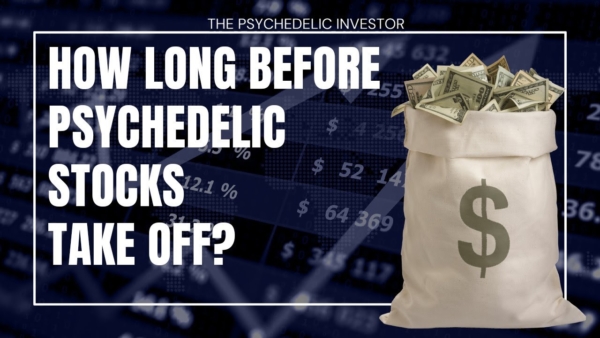
While researching a possible investment into psychedelic stocks, you have almost certainly heard the refrain of, “It’s a long term investment.” I myself, in my many videos for The Psychedelic Investor and articles for Psychedelic Spotlight, have probably said this over 100 times.
And while the thesis for investing in psychedelic stocks is appealing (read the full thesis here), having a timeline clearer than “it’s a long term investment” is necessary before deciding whether it is worth the risk.
In this article, therefore, I endeavor to answer a big question: “When will psychedelic stocks provide a significant return on investment?”
Or, translated to Reddit-speak: when moon?
To start, I feel it’s necessary to give the warning that the answer may be never. To be clear, while I personally believe in the potential for psychedelic stocks such as MindMed (Nasdaq: MNMD, NEO: MMED) and Cybin (NYSE: CYBN, NEO: CYBN), the entire psychedelic medicines industry is inherently speculative and there is no guarantee of success. Yes, the science right now suggests that treatments such as MDMA therapy for PTSD and Ketamine therapy for addiction will disrupt the mental healthcare market, but this needs to be confirmed in larger studies.
Plus, even if psychedelic medicines disrupt mental healthcare, there is no guarantee that any specific company will emerge as its leader. Therefore, to echo my previous articles, even if you believe in the industry, be prudent in your investments and don’t overexpose yourself to the volatile sector.
With that disclaimer out of the way, let’s hop into the heart of the matter.

There will be two separate turning points for psychedelic medicines and the companies that produce them: the legalization of the first psychedelic medicines, and the legalization of improved next-generation psychedelics.
The first will happen relatively soon.
In the next two years, due to positive clinical data, it is likely that MDMA-assisted therapy to treat PTSD and psilocybin-assisted therapy to treat treatment-resistant depression will be legalized in the United States. According to Rick Doblin, founder and Executive Director of the nonprofit MAPS, MDMA for PTSD will likely come first, perhaps before the end of 2023. Then, a year or two later, psilocybin for depression will follow. Other classical psychedelics such as LSD and DMT will likely follow a year or two after that.
This will be a massive development for the millions of people who suffer from these ailments, as the success rates found in clinical trials for these treatments are much higher than classical treatments.
From a business perspective, these legalizations will benefit two classes of psychedelic companies: clinics and producers. Clinics, since that is where people will be treated, and producers, as they will be creating the compounds. For example, Numinus Wellness (TSX: NUMI, OTC: NUMIF), should be well positioned as they both run their own clinics under the brand Mindspace Wellbeing and produce their own psilocybin.
But while this development would be huge for those seeking better help, we should not overestimate the significance from an investor standpoint. While it will obviously be good for companies in the space, there will be limiting factors.
First, for companies that produce psychedelic medicines such as MDMA and psilocybin, yes, of course medical legalization will be wonderful for their bottom lines. Their legal customer base will grow from solely universities and companies conducting clinical trials with several hundred patients, to hundreds of thousands and eventually, potentially, millions of people who need to be treated for mental health conditions.
But from a chemist or botanist’s perspective, neither creating MDMA nor growing (or synthesizing) psilocybin is particularly difficult. Plus, the production of these substances can scale quicker than the delivery of them, which will require mass therapist training campaigns and setting up brick and mortar clinics across the country. Therefore, the competition to produce and supply MDMA and psilocybin will be great.
Perhaps there will only be a few winners who can produce MDMA and psilocybin much cheaper than their competitors, or more nefariously are granted bad patents which give them the sole right to produce the compounds. But more likely, we will see dozens of companies competing to fill a demand limited by how quickly clinics can scale.
Again, many companies will do well and will likely be able to secure a solid profit margin. This will most likely result in their stock prices rising, and any early investments into these companies should pay off nicely. But the multi-billion dollar depression and PTSD medicine treatment markets will be split between perhaps dozens of companies, limiting how close to the moon any one can get.

On the clinic side, the problem of scaling will be greater. Yes, like with production, there will be dozens, if not hundreds of companies trying to get in on the gold rush (and make the world a better place). But scaling up the physical and human infrastructure needed to deliver a new paradigm of treatment will be much harder than scaling up production of a chemical.
Therefore, even if there are hundreds of clinic operators, as long as they do not exceed the demand for mental health treatment, which is massive, they should be able to grow at a stable, if somewhat slow, rate.
Despite these notes of caution, the legalization of MDMA Therapy for PTSD and Psilocybin Therapy for depression will undoubtedly be a boon for psychedelic stocks. In a few years time, this regulatory change will shift the financial outlook of companies who are at the moment spending money hand over fist on research, with little revenue to speak of. Plus the psychological effect of psychedelic medicines becoming real, and not just something found in clinical trials, will shift the narrative surrounding these companies.
The true turning point, however, will be the advent of next-generation psychedelics that are purposely made to treat specific mental health ailments. This is still likely around 5 years away, best case scenario.
While companies producing psychedelics under the first wave of legalization will only be able to compete on cost, under the second wave they will be able to compete on the effectiveness of their medicines as well.
As exciting as psilocybin and MDMA therapies are, they are not perfect. For example, psilocybin’s effects can last more than 6 hours, meaning a therapist needs to be paid for that entire time while they are watching over you. This would make psychedelic therapy prohibitively expensive for many people. There are also the issues of great variation of effects between individuals, and negative cardiovascular effects of repeated dosing of psilocybin.
Therefore, a company who can create a version of psilocybin that can counteract these issues by having a shorter acting version whose effects are the same for each patient and gets rid of the cardiovascular side effects, would have a more effective treatment option than those with regular psilocybin.
Most serious psychedelic manufactures are already working on creating the perfect next generation psychedelics. For instance, Cybin has their CYB-003, a psilocybin-like tryptamine that claims to have all of the above improvements. There is also MindMed, with a drug called 18-MC, which is based on a psychedelic called ibogaine. Ibogaine is extremely hallucinogenic and has been shown to negatively affect cardiovascular health, but it has also been effective in treating addiction. MindMed claims that 18-MC keeps the anti-addictive properties, but forgoes the hallucination and negative health side effects.
While these medicines aim to be tailored towards treating specific ailments with greater precision than current psychedelics, most are still in the preclinical stage of development. Some, like Cybin’s CYB-003 and Field Trip’s FT-104, are about to enter phase 1 trials. MindMed’s 18-MC is even further advanced, set to enter a phase 2a trial. But for the most part, next generation psychedelics are still in the lab.
This means that we are likely to see years spent on running these trials, interpreting the data, tweaking the molecules and/or the treatment regimens to get better results, and sometimes going back to the drawing board to start again. If everything goes well, we may see these drugs be approved and reach the market in around 5 years time. If there are significant setbacks, we could be looking at a 5-10 year timeline.

For the winners of this race, the spoils will be huge. If company X has a drug that, when combined with therapy, can effectively treat addiction in 80% of individuals at a lower cost than company Y, whose drug is only 60% effective, then the entire market will go to company X.
Of course, as a retail investor, in order to benefit from this, you have to predict the correct company years in advance. And while you can choose the companies currently leading the pack, there is no guarantee that they will hold their advantage over the coming 5 years. This is one of the central hurdles facing a retail investment in psychedelics, choosing the winners in advance.
That is why I prefer, mostly, to invest in ETFs, such as the Advisor Shares Psychedelics ETF (NYSE: PSIL). The idea is that the monstrous gains of the winners, whoever they may be, will more than make up for the losses of the many also-rans.
To answer the question I led this article with, before investing in psychedelic stocks, you must understand that there is a long time horizon before seeing significant alpha gains. The real turning point for the industry will be the advent of effective next generation psychedelics that have edited out the shortcomings of traditional psychedelics. That is still, minimum, 5 years away. If everything goes right.
This does not mean that they are a bad play. On the contrary, to quote Warren Buffet, “The stock market is a device for transferring money from the impatient to the patient.” If the thesis for investing in psychedelic stocks is solid, then we are playing a waiting game.
Full Disclosure: James Hallifax holds positions in MindMed, Compass Pathways, atai Life Sciences, the Horizons Psychedelic Stock Index, and the Advisor Shares Psychedelics ETF.
The views of the author are for informational purposes only, and should not be construed as financial advice, but rather his own personal opinion. Furthermore, the views of the author are not necessarily representative of Psychedelic Spotlight. His views and opinions are his own.





